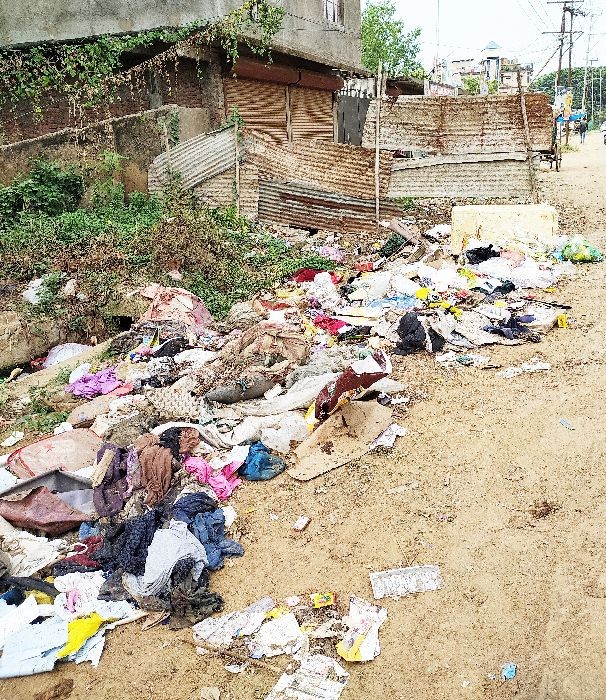Garbage dumped on the road side on the way to Signal Basti in Dimapur on August 31. (Morung Photo)

Communitization of sanitation, proper city plan and civic sense the way forward
Morung Express News
Dimapur | August 31
Dimapur, the main gateway and commercial hub of Nagaland, has earned the unenviable tag of being among the top ten “dirtiest’ cities in the country. According to Swachh Survekshan 2020 report, out of 382 cities (1-10 lakh population), Dimapur and Kohima were ranked 375 and 325 respectively in the national ranking of clean cities. Two other North East cities–Shillong and Itanagar-are also included among the top ten dirtiest cities in India.
However, for most Dimapurians, the news did not come as a surprise taking several factors into account: an unplanned city which has witnessed unprecedented population growth over the last couple of decades, poor sanitation and drainage system, lack of civic sense and rampant encroachment of public land and spaces.
The Morung Express contacted ADC-cum-Administrator of Dimapur Municipal Council (DMC), Albert Ezung, and former chairperson of DMC, Y Vikheho Awomi, on the factors behind Dimapur being ranked in the bottom of the clean cities list, the functioning of the municipal body and their personal viewpoints and suggestions.
Challenges and drawbacks
On the dismal ranking of Dimapur, Albert Ezung who took over as administrator of DMC barely a year ago admitted that he has nothing much to comment at the moment. “The methodology used for the survey is being analyzed,” he said.
Ezung said shortage of machinery and resources, lack of good drainage systems, limited space in market/commercial areas and other basic civic amenities are some challenges faced by DMC while discharging its civic duties.
“But apart from these, the main challenge is inculcating civic sense among the general populace. The awareness about individual's responsibility in maintaining public hygiene and cleanliness is still low,” he said.
The DMC Administrator also said though presently the municipal body is not facing shortage of manpower, but machineries and resources needed to be augmented urgently for DMC to function smoothly and meet citizens’ expectations.
Vikheho Awomi, the first chairperson of DMC after the upgradation of Dimapur Town Committee to municipality, said the main drawback of Dimapur is that the city did not have a master plan from the beginning.
He also concurred that generally speaking, Nagas have a long way to go when it comes to civic sense and usage of public property. “Population keeps on growing and the number of vehicles as well. But the road and space remain the same. Encroachment and haphazard construction of buildings, clogged drainage, and insufficient machinery are the major challenges faced by our city,” Awomi said.
The former DMC chairperson said Dimapur being one of the fastest growing cities in the North East, the volume of daily garbage is very high, which makes it a herculean task for the DMC to tackle without support and cooperation of every citizen.
“An effective and sustainable waste management system is a salient factor on the heels of rampant urbanization and development. Due to lack of space and congestion, it is difficult to build proper designated dustbins in the main city.
People are habituated to throw garbage at their own convenient place on the roadsides starting from late night onwards till the municipal scavengers collect them in the early morning,” Awomi said.
Formulating action plans
Queried whether DMC is formulating any strategy or action plan to address the chronic problems of the city, Ezung said people’s participation and communitization of sanitation are very crucial.
Accordingly, he said colony sanitation committees have been set up in all colonies under DMC, organizing cleanest colony competition, empowering the colony councils, IEC campaigns and street workshops in market places and collaboration/partnership with NGOs and CSOs.
Ezung also informed that the DMC is taking up in right earnest the ‘garbage to gold project’, mission drainage clearance, activating enforcement task force, solid waste management and processing etc.
Awomi was of the view that the Municipal Council would function more efficiently under elected municipal members. “If the Municipal Council functions under an administrative head, it may help in some administrative aspects of governance. However, the scope of expansion and functioning under elected representatives has greater prospects,” he said.
Towards a cleaner city
Sharing his opinion on how to make Dimapur a cleaner, vibrant and attractive city, Ezung said, “With increase in population the garbage generation is only increasing in leaps and bounds. Unless all sections of the people realize that sanitation is a collective responsibility, DMC or any other agency cannot do justice.”
He observed that there needs to a better coordination between different government departments for improving the civic amenities including sanitation. “Local functionaries at the colony level should be strengthened and, above all, people's support and cooperation to DMC to render and give best service to Dimapur city,” he stated.
According to Awomi, some steps which can be taken towards attaining a cleaner Dimapur city includes “Solid waste management: we need planning for collecting and treating solid wastes; Good governance: The institution should produce results that meet the needs of the society while making the best use of resources at its disposal; Public support: Dimapur can surely be more beautiful, clean and healthy and a better place to live in if only each and every citizen equally contributes, provide full co-operation and ensure to play their part in civic sense and be more responsible; and Proper city plan: A city development plan is both a perspective and a vision for the future development of a city.”






